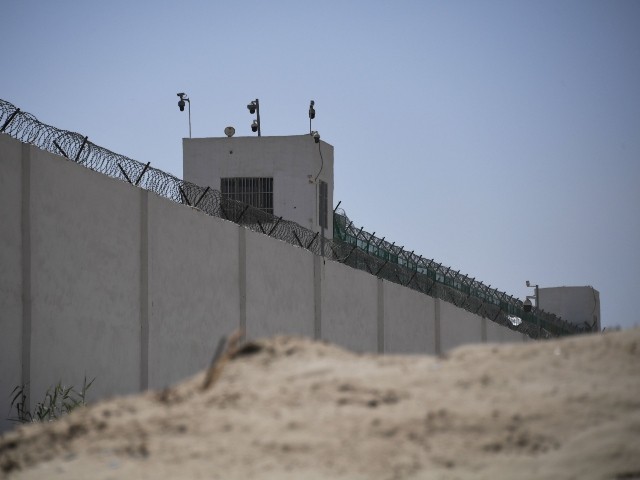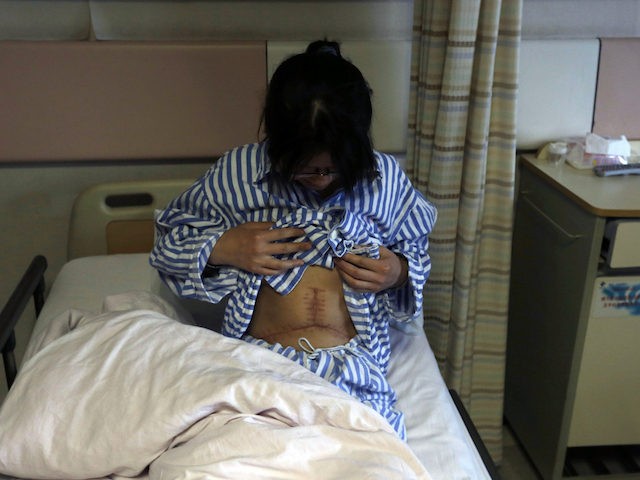The House of Representatives passed a bill on Monday to sanction individuals involved in the forced organ harvesting trade, a practice reportedly dominated by communist China by which, human rights experts believe, the regime kills thousands through “execution by heart removal” every year.
The Stop Forced Organ Harvesting Act of 2023 is authored by Rep. Chris Smith (R-NJ) and co-sponsored by Reps. Michael McCaul (R-TX), Bill Keating (D-MA), and Kathy Manning (D-NC). It passed the House of Representatives 412 to two in a vote on Monday. Rep. Thomas Massie (R-KY), who regularly votes against bills targeting China’s human rights atrocities, and Rep. Marjorie Taylor Greene (R-NC) were the lone votes against the bill. The legislation now awaits action from the Senate to advance to the next step in becoming law.
“Every year, under General Secretary Xi Jinping and his Chinese Communist Party, between 60,000 to 100,000 young victims—average age 28—are murdered in cold blood to steal their internal organs,” Rep. Smith said on Monday following the vote. “These crimes against humanity are unimaginable.”
The current iteration of the Stop Forced Organ Harvesting Act that passed the House of Representatives does not target China exclusively, requiring the government to add reports on forced organ harvesting and organ trafficking to human rights reports. It also grants the president and State Department the power to sanction an individual “that the President determines funds, sponsors, or otherwise facilitates forced organ harvesting or trafficking in persons for purposes of the removal of organs.”
The individuals could lose access to an American passport or be blocked from entering the country, with the exception of access to the United Nations facility in New York. Given the large volume of evidence implicating the Chinese government in forced organ harvesting from political prisoners, the bill could potentially apply to high-ranking Chinese officials, including dictator Xi Jinping, if the president identifies them as fitting the qualifications in the bill.
Extensive evidence, including the eyewitness testimony of multiple participating doctors, indicates that the Chinese government has killed political prisoners for their organs for decades, particularly targeting Uyghur Muslims in occupied East Turkistan and Falun Gong practitioners nationwide. The scale of forced organ harvesting – the extraction of organs from a person while alive to be transplanted into a patient needing it – is believed to have increased dramatically since dictator Xi Jinping launched the ongoing genocide of Uyghurs and other ethnic Turkic people in East Turkistan, fueled by the imprisonment of up to 3 million people in concentration camps since at least 2017. Some survivors of the concentration camp have reported experiencing medical testing consistent with organ matching and the disappearance of young prisoners fitting the profile of prime organ donors.

This photo taken on May 31, 2019, shows the outer wall of a complex which includes what is believed to be a re-education camp where mostly Muslim ethnic minorities are detained, on the outskirts of Hotan, in China’s northwestern Xinjiang region. (GREG BAKER/AFP via Getty Images)
The sheer scale of China’s organ transplant operation has also raised international alarm. As explained in a 2019 report by the China Tribunal, an independent legal body organized to assess the quality of the evidence implicating China in gross human rights abuses, “there is a mismatch between the number of donors who become ‘eligible’ each year by dying and the number of actual transplants performed each year.”
“There are more transplants than could possibly come from the number of registered or ‘eligible’ donors,'” the report continued. “Given that the PRC [People’s Republic of China] asserts that it no longer uses executed prisoners for organ transplant purposes the very substantial mismatch is wholly unexplained and demands justification.”
The Chinese government, through its state media arms, has addressed the surge in organ transplants in the country by attributing it to the miraculous efficiency of the communist system and youthful passion for service, boasting of the number of transplants conducted without clarifying where the “volunteers” for such transplants come from. In 2021, the state-run Global Times newspaper boasted that the Chinese National Health Commission had documented 100 times more organ donor “volunteers” that year than in 2015. The year 2015 is a notable milestone to choose as human rights experts place the construction of the Uyghur concentration camps in 2017.
Prior to the increase in international attention around China’s organ transplant system, led by years of advocacy by Falun Gong and Uyghur activists, among others, the Chinese government took less care to address the numbers.
“The leader of China’s transplant sector wrote in 2007 that effectively 95% of all organ transplants were from prisoners,” a study published last year by the Australian National University (ANU) observed. “[G]iven that the donors could not have been brain dead before organ procurement, the declaration of brain death could not have been medically sound.”

Falun Gong demonstrators dramatize an illegal act of paying for human organs during a protest April 19, 2006, in Washington, DC. (JIM WATSON/AFP/Getty Images)
ANU’s report accused the Chinese government of “execution by heart removal” of thousands of prisoners, many of them prisoners of conscience.
In May, Rep. Smith organized a hearing inviting experts on China’s political prisoner organ harvesting to testify to Congress. Ethan Gutmann – a senior research fellow in China studies at the Victims of Communism Memorial Foundation and co-author of the landmark works on the subject, “Bloody Harvest” and “The Slaughter” – estimated at the hearing that China could be selling as many as 150,000 organs annually from its victims, about two or three per person. Gutmann’s estimate was based on an assessment of the East Turkistan concentration camps.
“There are two kinds of people who leave the camps early: The first are young people, about 18 years old … The second group’s average age is usually 28 or 29 – the exact stage of physical development that the Chinese medical establishment prefers for organ harvesting,” he explained. “Witness testimony from approximately twenty camps is strikingly consistent: between 2.5 percent to 5 percent annual disappearances for the 28-year-old age group.”
“If we assume that at any given time since 2017, there are approximately a million Uyghurs, Kazakhs, Kyrgyz and Hui in the camps, my estimate is that 25,000 to 50,000 camp detainees are being harvested every year,” Gutmann told Congress.

COMMENTS
Please let us know if you're having issues with commenting.